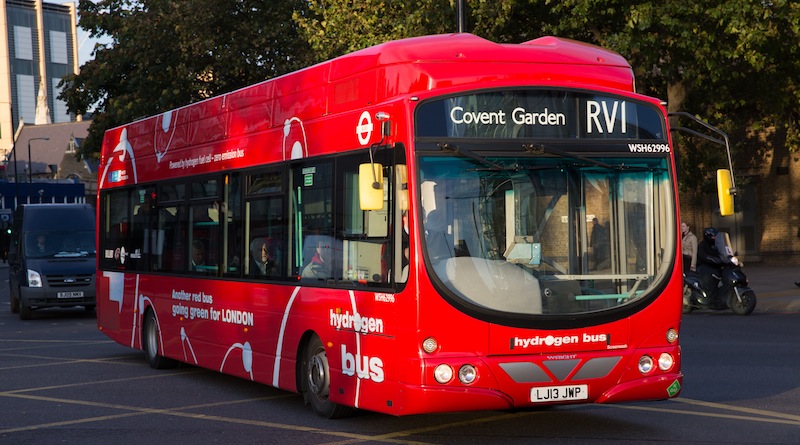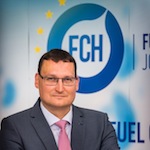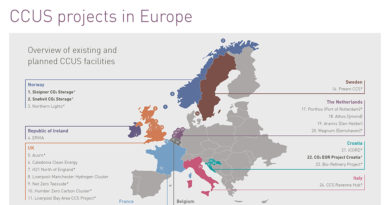
Advantages of a JU for a Clean Energy future
The Fuel Cell and Hydrogen Joint Under- taking (FCH JU) is one of seven Joint Undertakings furthering research and innovation in the form of public-private part- nerships to deliver a more sustainable and prosperous future for Europe’s citizens.
Working with research and industry partners to develop fuel cell and hydrogen technology,
the FCH JU supports early market deployment into sectors such as transport and residential energy benefiting citizens and businesses, and building towards Europe’s vision of a clean energy future.
In less than ten years, more than 203 projects have been funded, with over € 1.5 billion from the public and private sectors. The 10th edition of the FCH JU Stakeholder Forum in November 2017 provided an opportunity to celebrate the achievements, and the progress made in the last decade.
The first phase of the FCH JU was funded under the Seventh Research Framework Programme (FP7), and ran for six years till 2014. With the recognition of its success, funding was extended under the Horizon 2020 Framework Programme, enabling the FCH JU to continue its core work: bringing together industry and research groupings, such as Hydrogen Europe and Hydrogen Research Europe, and working collaboratively to deliver clean and efficient fuel cell and hydrogen technologies to market and help tackle major global challenges in the areas of energy supply and security, transport, health, and the environment.
As noted in the European Commission’s recently published report LAB – FAB – APP: Investing in the European future we want, ‘investing in research and innovation is increasingly crucial for shaping a better European future in a rapidly globalising world.’ Working in an innovative triumvirate public- private partnership (PPP) structure, the FCH JU has enabled research to take place on a sufficient scale for technological breakthroughs, bringing together stakeholders from different sectors and from across borders.
This is helping to position Europe competitively in the development of this strategically important technology. By overcoming price and performance barriers for fuel cell and hydrogen technology, and facilitating commercial uptake, the FCH JU’s work leads to direct benefits for European industry, research, SMEs and better quality of life for citizens.
In the European Commission’s recent interim evaluation of Joint Undertakings, it was recognised that FCH JU activities are ‘highly relevant to the grand challenges facing Europe by supporting the climate change objectives, helping improve energy security and contributing to raising the status of Europe as an international leader in FCH technologies’.
In the last ten years, huge strides have been made in the advancement of fuel cell and green hydrogen technologies, aimed at delivering more efficient, secure and clean energy.
These technologies are now recognised as key enablers in Europe’s transition to a low-carbon economy, and are contributing to the achievement of goals such as a reduction of greenhouse gas emissions of 60% in the transport sector by 2050 and a 10% share of renewable energy in transport by 2020, to take just two examples.
The type of applications supported by the FCH JU include hydrogen fuel cell-powered buses, cars and taxis, which can decarbonise the transport sector. Other projects are aiming at the mass-scale roll-out of fuel cell micro-cogeneration units the latest smart home energy solution.
The involvement of research and industry partners in developing these applications is, in turn, building a thriving community of European manufacturers and companies committed to scaling up production, and bringing fuel cell and hydrogen-powered clean energy solutions to the mass market.
Key achievements
The projects carried out through this programme demonstrate the technical and early economic feasibility of the hydrogen solution.
Engagement with industry in order to realise the potential of the technologies involved has been central to the FCH JU’s mission from the beginning.
Thanks in part to the synergies of the FCH JU, Europe is now at the cutting edge in the development of hydrogen fuel cell buses, hydrogen refuelling infrastructure and renewable hydrogen production.
A series of FCH JU-funded projects has set out to improve the reliability and power yield of electrolysers, as the core production technology for green hydrogen. The HyBalance project focused on the feasibility of using central large-scale electrolysers to supply grid services, as well as hydrogen for high-value markets.
HyBalance proved that outputs of more than 1 MW were perfectly feasible for proton exchange membrane (PEM) electrolysers. A subsequent project, H2 Future, will provide affordable, green hydrogen for use in steel-making processes as well as electricity grid balancing services.
Significant research has also been invested in the improvement of membrane electrode assembly, the vital component at the core of every fuel cell and electrolyser.
Another key area of technological development has been in automotive fuel cell stacks for transport applications. The FCH JU worked on making Europe more internationally competitive in this area as we were lagging behind other parts of the world in this crucial technology.
Their efforts culminated in the launch in 2017 of a three-year, € 60 million German consortium-led project, which will further facilitate the production of fuel cells for automobiles a good example of European research being harnessed at a national level.
Transport
Huge progress has been made in the realm of transport in particular, where the FCH JU promotes viable and competitive alternatives to fossil fuels.
Fuel cell cars are now on the verge of penetrating the mainstream market, as hydrogen refuelling infrastructure expands, and the latest models have reliability and ranges com-parable to conventionally powered cars. These advances are in part due to a series of FCH JU- funded projects, including large-scale projects HyFIVE and H2ME.
Hydrogen Mobility Europe (H2ME) is the biggest demonstration project to date. The first project – H2ME – began in 2015, aiming to deploy 29 hydrogen refuelling stations and 325 vehicles. Now, since 2016, H2ME2 is adding a further 20 hydrogen refuelling stations and more than 1,100 vehicles.
Another initiative under this project was the HYPE hydrogen taxi fleet in Paris, where the largest fleet of fuel cell taxis in the world now operates. By using hydrogen from wind power, a global warming potential reduction of up to 83% is possible for a fuel cell taxi compared to a diesel taxi.
Public transport is a key sector in which advances are being made too (and fuel cell buses were very much in evidence at the COP23 in Bonn). The FCH JU co-financed the Clean Hydrogen in European Cities (CHIC) project in 2010, providing € 26 million out of a total of € 82 million to demonstrate across eight countries that fuel cell hydrogen buses can provide a functional solution to the challenges of decarbonisation.
Following CHIC, other FCH JU projects have proven that fuel cell buses can operate with the same flexibility as diesel buses without compromising the pro- ductivity of public transport.
SMEs
One of the FCH JU’s top strategic priorities is to ensure that the SME sector remains a key player in hydrogen and fuel cell development. Here, the FCH JU has helped to pioneer new kinds of public–private partnerships, including a community that allowed the innovation inherent in SMEs to thrive while working with, and benefiting from, interaction with large organisations.
The FCH JU structure specifically helps smaller companies to develop demonstration projects that may otherwise be too expensive. It also permits a long term, strategic perspective on the sector. With 27 % (€ 77.7 million) of its financial program me dedicated to smaller businesses, the FCH JU has already exceeded the Horizon 2020 target of ensuring that at least 20 % of its funding is allocated to SMEs.
Future outlook
By 2020, the FCH JU aims at developing very efficient fuel cell systems; continuing the suc- cessful demonstration and roll-out of fuel cell applications for homes and businesses in many countries, and providing cleaner transport solutions. Investments by the private sector will be further leveraged by European-funded research and innovation, with knock-on societal benefits.
The FCH JU will continue to drive the uptake of fuel cell hydrogen technology, drawing on the strength of its public- private partnership structure to deliver the best results, and working with other JUs to maximise the production of knowledge and its conversion into innovation.




